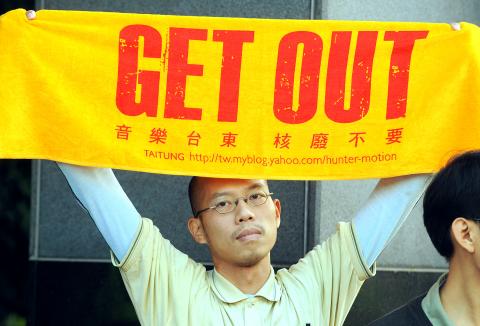A dozen anti-nuclear activists protested in front of the Environmental Protection Administration (EPA) building in Taipei yesterday, accusing the government of having no solution for dealing with nuclear waste.
The protest occurred as an environmental impact assessment meeting was beginning at the EPA.
Thousands of anti-nuclear protesters clashed with police over nuclear waste issues in Germany on Friday.

Photo: CNA
Earlier this month, the Ministry of Economic Affairs said that high-level radioactive waste could be disposed of outside of the country and that low-level radioactive waste could be disposed of in Taiwan, some within the plants and some in repositories, during a press conference on energy policy at the Presidential Office.
At yesterday’s second environmental impact assessment meeting on radioactive waste disposal policies, the Atomic Energy Council reported its strategies on nuclear waste storage, including putting the spent fuel rods in storage pools, land-based dry repositories and a final disposal site, while interim storage of spent fuel may include reprocessing abroad.
The protesters said the government was hiding the truth about the danger of both wet and dry storage of spent nuclear fuel by saying that the waste could be dealt with abroad, when actually the final disposal site might be in Taiwan.
They urged the government to halt operations at nuclear power plants to prevent the threat posed by an increasing number of nuclear fuel rods while no safe disposal site exists.
“There are two methods of disposal beyond our national borders. One is to dispose of the spent fuel at a final disposal site abroad, for which there is no precedent internationally,” Green Citizens’ Action Alliance secretary-general Hung Shen-han (洪申翰) said.
“The second is to ship the spent fuel abroad for reprocessing, meaning the uranium would be refined and recycled, but will still be shipped back to Taiwan,” Huang said. “It is irresponsible to say that we can dispose of the spent fuel beyond our national borders.”
The alliance said a feasibility study on the final disposal site would not be finished until 2037, but with the unstable geological conditions in Taiwan and possibly no safe disposal site abroad, it said it wondered where the large number of spent fuel rods would be stored.
“We suggest the government store spent fuel in the basement of the Presidential Office, to let -everyone know that it isn’t dangerous,” Gongliao Anti-nuclear Self-Help Association chairman Wu Wen-chang (吳文樟) said.
The protesting groups included the Green Party Taiwan, Wild at Heart Legal Defense Association, the Homemakers’ Union and Foundation, Taitung Anti-Nuclear, the Anti-Spent Fuel Association and several others.

Chinese Nationalist Party (KMT) Chairman Eric Chu (朱立倫), spokeswoman Yang Chih-yu (楊智伃) and Legislator Hsieh Lung-chieh (謝龍介) would be summoned by police for questioning for leading an illegal assembly on Thursday evening last week, Minister of the Interior Liu Shyh-fang (劉世芳) said today. The three KMT officials led an assembly outside the Taipei City Prosecutors’ Office, a restricted area where public assembly is not allowed, protesting the questioning of several KMT staff and searches of KMT headquarters and offices in a recall petition forgery case. Chu, Yang and Hsieh are all suspected of contravening the Assembly and Parade Act (集會遊行法) by holding

PRAISE: Japanese visitor Takashi Kubota said the Taiwanese temple architecture images showcased in the AI Art Gallery were the most impressive displays he saw Taiwan does not have an official pavilion at the World Expo in Osaka, Japan, because of its diplomatic predicament, but the government-backed Tech World pavilion is drawing interest with its unique recreations of works by Taiwanese artists. The pavilion features an artificial intelligence (AI)-based art gallery showcasing works of famous Taiwanese artists from the Japanese colonial period using innovative technologies. Among its main simulated displays are Eastern gouache paintings by Chen Chin (陳進), Lin Yu-shan (林玉山) and Kuo Hsueh-hu (郭雪湖), who were the three young Taiwanese painters selected for the East Asian Painting exhibition in 1927. Gouache is a water-based

Taiwan would welcome the return of Honduras as a diplomatic ally if its next president decides to make such a move, Minister of Foreign Affairs Lin Chia-lung (林佳龍) said yesterday. “Of course, we would welcome Honduras if they want to restore diplomatic ties with Taiwan after their elections,” Lin said at a meeting of the legislature’s Foreign Affairs and National Defense Committee, when asked to comment on statements made by two of the three Honduran presidential candidates during the presidential campaign in the Central American country. Taiwan is paying close attention to the region as a whole in the wake of a

OFF-TARGET: More than 30,000 participants were expected to take part in the Games next month, but only 6,550 foreign and 19,400 Taiwanese athletes have registered Taipei city councilors yesterday blasted the organizers of next month’s World Masters Games over sudden timetable and venue changes, which they said have caused thousands of participants to back out of the international sporting event, among other organizational issues. They also cited visa delays and political interference by China as reasons many foreign athletes are requesting refunds for the event, to be held from May 17 to 30. Jointly organized by the Taipei and New Taipei City governments, the games have been rocked by numerous controversies since preparations began in 2020. Taipei City Councilor Lin Yen-feng (林延鳳) said yesterday that new measures by